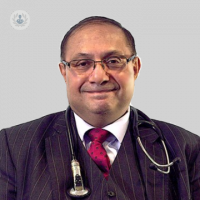Modern dementia treatment: personalised medicine and the power of lifestyle adjustments
Written in association with:You can live with dementia and can control it. The modern management of dementia involves making small but powerful lifestyle changes and having a personalised approach to your medication. Dr Mashkur Khan will explain how these approaches can give you extra years and increase your quality of life.

The modern approach to managing dementia and memory loss
Personalised medicine is the way forward. There is no “one size fits all” approach to treating dementia and we need to take into account each patient’s individual risk factors.
The main consideration is the expectations of the patient and family, and what they want to do.
A patient could say:
- “All I want is to have a holiday”
- “I want to go to my daughter’s wedding”
- “I want to meet my friend down the road every day”.
The ultimate goal is to meet the patient’s goal. I don’t believe in offering a 45-year-old with dementia the same treatment as someone who is 85 with dementia. We need to apply a personalised approach that matches a patient’s lifestyle.
Dementia is unlike other diseases that generally require a more traditional approach to treatment e.g. they have option A, B or C for treating heart disease. The brain is incredibly complex, meaning that each person can react differently to dementia.
Lifestyle is a powerful tool in dementia management
Dementia can be slowed down and in some cases, halted. The well-known phrase “if you use it, you lose it” also applies to the brain. We know that non-pharmacological methods can be protective against dementia. You’ll live extra years and increase your quality of life.
1. Destress life
Having as positive an approach as possible makes a great difference. Being able to say: “It’s okay, I accept that I’ve got dementia and I’ll have good and bad days” increases a patient’s overall happiness compared to if they are consistently feeling saddened.
Cut out stress where you can. Some people try meditation or yoga. Find what works for you to keep your stress levels down. Research suggests that cortisol (the stress hormone) is linked with memory loss.
2. Stimulate your brain
Stimulating the brain keeps you thinking faster for longer. To repeat my earlier point: “If you don’t use it, you lose it”. People who use their brain have a reduced dementia risk compared to people who have a sedentary lifestyle and who don’t engage their brain. Read the paper or a book if you can, but if you can’t read a book, read the paper, try puzzles and do jigsaws – these will help.
2. Exercise
Exercise has an impact. There is some evidence about regular walking: they say it doesn’t matter how far you go, but it’s the time you spend walking that matters. You’ve got to walk for 40 minutes, five days a week for it to be protective against dementia.
Exercise is also beneficial for dementia management because obesity is a risk factor for dementia. Losing weight will reduce this risk factor.
3. Diet
Some diets are incredibly helpful in halting dementia. The Mediterranean diet is particularly known to help protect against dementia, and there is good evidence: salads, olive oils and healthy food such as oily fish have plenty of antioxidants, which are good for the brain.
There is some evidence that vitamin E can help protect you against dementia, but this hasn’t been fully explored yet.
There is very good evidence about specific fruits being extremely useful for halting memory loss, such as pomegranate.
Drinking coffee may help in halting memory loss. Caffeine can be converted to dopamine acitelcolene, which works on the D1 and D2 receptors. Stimulating these receptors is helpful in slowing dementia.
Modern drugs for dementia
There are numerous modern medical treatments to help slow the progression of dementia.
Not everyone will have the strongest medication as the best option. For example, I’ll choose the most appropriate type of medication (or combination of medication) depending on the severity of dementia and the stage of the illness. Everyone is different, and it’s a clinical decision taken by the doctor and patient.
Mild-moderate dementia
- We have very effective anti-dementia drugs, such as Donepezil (Aricept is a popular brand name of this drug). It can delay serious dementia symptoms by up to 5 years in some people. This is a weaker form of dementia drugs.
- Rivastigmine transdermal patches are also a weaker form of treatment. These patches are applied like a plaster and the inhibitors within them go straight into the bloodstream. These patches have a quicker effect than other drugs and they’re great for treating patients with swallowing problems.
- There is a British drug called Galantamine. This is a second-line treatment for treating cognitive decline in people with mild or moderate dementia.
Moderate-severe dementia
- Memantine is an extremely good treatment for slightly more advanced dementia, and it’s a best seller in America. This is one of the strongest dementia drugs and is used as a second-line treatment. Memantine has transformed a lot of people’s lives. It has the potential to make a positive change in the domains of attention (alert and responding), memory and language.
- Sometimes we use two drugs, and this is called dual therapy. There have been studies from European countries such as Germany and Belgium which support the advantages of dual therapy. For example, I often recommend memantine and rivastigmine patches together in patients with moderate to severe dementia.
Do you need specialist advice on dementia management? Dr Mashkur Khan has spent more than 25 years diagnosing and treating dementia. Visit his profile to learn how he can help you.


